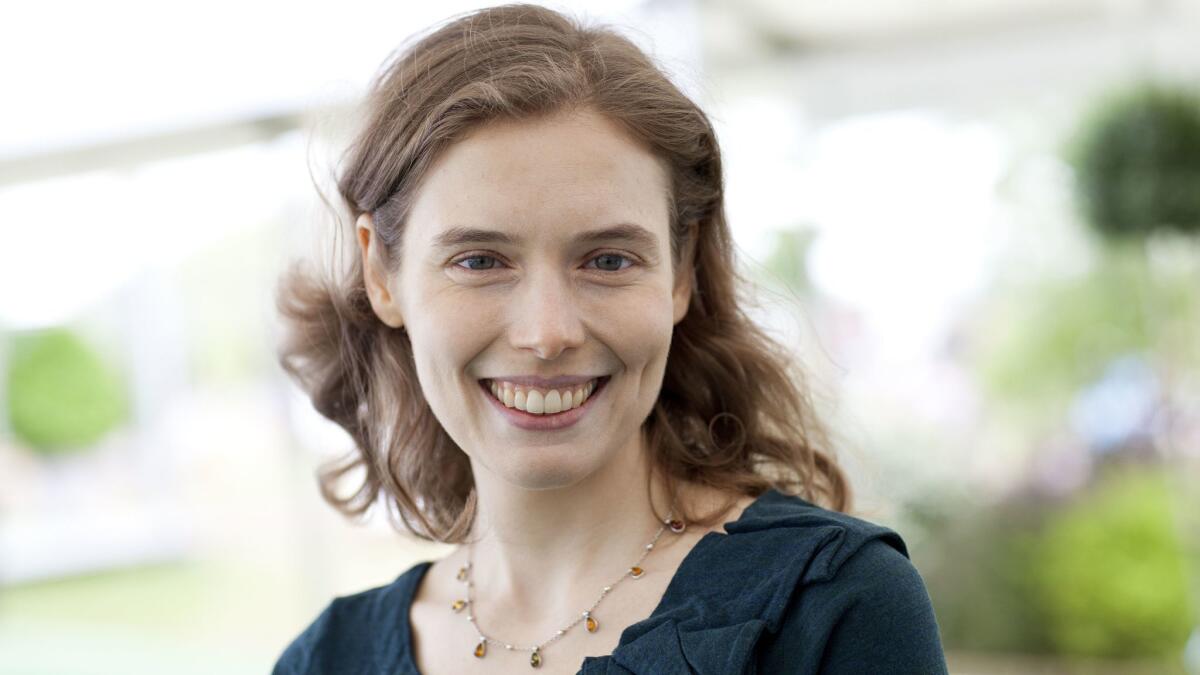Madeline Miller on ‘Circe’ and the staying power of myth

- Share via
Imagine that Achilles, that legendary warrior, was in love with his second-in-command, Patroclus. But you don’t need to, since Madeline Miller’s “The Song of Achilles” (winner of the 2012 Orange Prize for Fiction) does exactly that. Her version of Homer’s “The Iliad” showed the lover beneath the fighter, a strong man laid tenderly low. It was also propulsive, a story driven by the men’s knowledge that both will die, and the reality that no prophesy can forestall human grief.
Miller’s new novel, “Circe,” takes a circular, rambling path in telling the story of a goddess. Circe’s previous fame derived from her appearance in Homer’s “The Odyssey,” when she turned Odysseus’ ship crew into pigs while bewitching him for a stay on her island, Aiaia. “What would this epic story look like if it were based upon a woman’s life?” Miller asks. “This is Circe’s epic, and I wanted her to be a person who makes mistakes and has regrets and goes down blind alleys. She’s forging her identity, and that is not a linear process.”
From her bookish Manhattan childhood to her undergraduate classics major at Brown to her years teaching high-school Latin, Miller has been obsessed with ancient literature, but focused on its untold edges. While “The Song of Achilles” took her 10 years to write, “Circe” was finished in six. “I really need to hear the character delivering the monologue of their life in order to write the book. And it took me five years to hear Circe’s voice,” Miller says. “Because she’s a goddess, she speaks differently from the way mortals do, more directly. It was tough to capture her tone.”
But while creating that voice was difficult (“I basically rewrote the same 50 pages about 50 times during those years”), it allowed Miller to examine the world of the gods, beings who “only pursue their own interests. Part of what makes us human is how we strive, fail and get up again It creates empathy and humility, of which the gods have none.”
The gods can also forge masterworks with a snap of their fingers. What does it mean to work on things, to obsess about getting things right? “Circe” includes weaving and cooking and medicine-making, all crafts that were traditionally part of the woman’s realm. “I wanted that to be the center of the story, something that is vital to life and shouldn’t be shunted aside,” says Miller. “Hard work is very epic, a key part of how we’re able to live and go on in the world so that the heroes can go out and have their epic battles.”
Another thing the world needs of which not much is seen in classical literature is childbearing; there are memorable scenes of it in this book. “If you have the opportunity to write a scene of a Minotaur C-section, I think you’re obligated to,” Miller laughs.
In the years between her novels, she’s become a mother of two, and she acknowledges that the visceral nature of 3 a.m. feedings has brought parenting to the foreground in her work. “I wanted Circe’s experience of motherhood to speak of things that are often excluded from ancient epics. That said, I’m glad my children are not demigods.”
Does writing about those excluded things worry Miller’s scholarly side? “There’s always a little push and pull for me between academics and creativity. But with ‘Circe,’ I really had to give myself permission to say, ‘This is my version.’ My version diverged defiantly at times.” She says she was pleasantly surprised by her reception from the classics community, until realizing that “classicists love these stories, retelling these stories are a way for the stories to live. My fellow classicists support not just me and my work, but all the ways these stories are being brought back into the world.”
Miller plans to turn to Virgil next — maybe. When she began “The Song of Achilles,” “I had two characters completely possessing and gripping me. Now the character drawing me is from the ‘Aeneid.’ But I have to be completely obsessed with a character, and I’m also drawn to Shakespeare’s ‘The Tempest.’” The other great love of her life besides the classics, says Miller, is directing Shakespeare. “Most people know that at the end of ‘Hamlet,’ there’s going to be a high body count, so what is most important is the arc of the characters.”
When will we see either of those books? Miller laughs again. “Whoever Virgil was, it took him 10 years to write ‘The Aeneid,’ and you can feel it. This is someone who worked on his text, fought it out. Someone said if you broke it down to daily work, that would be three lines a day. I have not made those calculations, but it feels right.”
Madeline Miller will appear at 2 p.m. April 22 at the Festival of Books on the panel “Fiction: Epics Old and New” with Janet Fitch (“The Revolution of Marina M.”), Laila Lalami (“The Moor’s Account”) and A.G. Lombardo (“Graffiti Palace”), moderated by Chris Daley.
Patrick is a writer and critic whose work appears in the Washington Post and on NPR Books.
More to Read
Sign up for our Book Club newsletter
Get the latest news, events and more from the Los Angeles Times Book Club, and help us get L.A. reading and talking.
You may occasionally receive promotional content from the Los Angeles Times.






